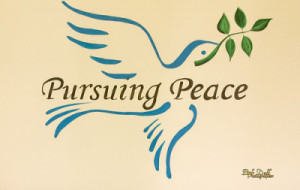Peace Advocacy in the Western Plains

Being Peace
Richard Rohr’s Daily Meditation from Thursday, August 23, 2018
From the Center for Action and Contemplation
Paul Knitter has been an activist for peace and justice since the 1980’s. He is inspired by Engaged Buddhism, a term coined by Thich Nhat Hanh, which brings insights from Buddhist practice and teaching to social, political, environmental, and economic injustice:
Buddhists are much more concerned about waking up to our innate wisdom and compassion (our Buddha-nature) than they are about working for justice. If Christians insist that “if you want peace, work for justice,” the Buddhists would counter-insist, “if you want peace, be peace.” That’s the point Thich Nhat Hanh gently drives home in the little book . . . Being Peace. His message is as simple and straightforward as it is sharp and upsetting: the only way we are going to be able to create peace in the world is if we first create (or better, find) peace in our hearts.
Being peace is an absolute prerequisite for making peace. And by “being peace,” . . . [Thich Nhat Hanh] means deepening the practice of mindfulness, both formally in regular meditation as well as throughout the day as we receive every person and every event that enters our lives; through such mindfulness we will, more and more, be able to understand . . . whomever we meet or whatever we feel, and so respond with compassion. Only with the peace that comes with such mindfulness will we be able to respond in a way that brings forth peace for the event or person or feeling we are dealing with.
This Buddhist insistence on the necessary link between being peace and making peace reflects Christian spirituality’s traditional insistence that all our action in the world must be combined with contemplation. . . . But the Buddhists are very clear: while both are essential, one holds a priority of practice. If action and contemplation form a constantly moving circle in which one feeds into the other, the entrance point for the circle is contemplation.
I (Richard) personally believe the entrance point can be either action or contemplation. Most people act, love, sin, risk engagement, and make mistakes before they personally experience their own deep need for contemplation. Until you have “loved and lost,” your contemplation is often gazing at your navel instead of a passionate search for God and for your calling.
Knitter continues:
Why? Just why do Buddhists insist on the priority of Awakening over acting? Why do they want to “just sit there” before they “do anything”? Certainly, there are different ways a Buddhist might answer this question. But I believe that one of the recurring responses would be: to remove one’s ego from one’s peacemaking, so that one’s actions will not be coming from one’s ego-needs but from the wisdom and compassion that constitute one’s true nature.
When we founded the Center for Action and Contemplation over thirty years ago, we envisioned spending half our time teaching contemplation and half teaching social justice. But for the same reasons Knitter gave, as well as the fact that most Western people are already geared toward action but need training in contemplation, we now spend much of our effort teaching various approaches to contemplation, knowing that if the inner world is authentic, an individual’s political, economic, and service attitudes will change organically from the inside out.
Thanks for reading!
“Seek peace, and pursue it.” Psalm 34: 14b
Terri Torres
WPD Peace Coordinator
